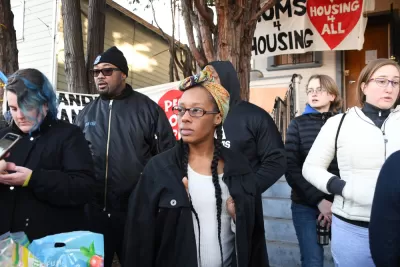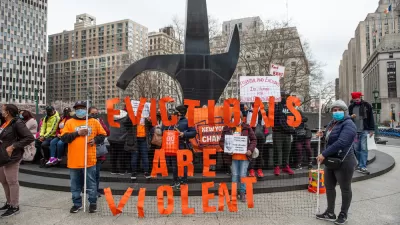Add the coronavirus pandemic to an already deeply troubled housing market and the Bay Area has a recipe for even more displacement in a region already facing a massive demographic shift.

The COVID-19 pandemic has had a disproportionate effect on the health and housing security of Black Americans, according to a survey conducted from July to August 2020 by National Public Radio, the Robert Wood Johnson Foundation, and the Harvard University T.H. Chan School of Public Health.
An article by Elliott Jones, an organizer and founder of Ensure Progress, examines the possibility that the economic effects of the pandemic might exacerbate the ongoing exodus of Black people from central Bay Area cities of Oakland and San Francisco.
According to Jones, "the startling increase in the cost of housing in San Francisco and Oakland has made displacement and gentrification all but inevitable." Moreover, "Over the past four decades, Black residents have been increasingly priced out of the home and rental markets in these two cities, with small bungalows that used to provide middle-class housing now regularly selling for over $1 million."
So Black people have for years already been moving to farther flung suburbs in the Bay Area, like Pittsburg, Antioch, and Concord; to exurbs like Stockton and Fairfield; and beyond, to other parts of the state and country.
"As a result of this movement, these communities have experienced a significant shift in their demographics. Fairfield now has a Black population of 16 percent. Stockton has a rising Black population of 14 percent, and 18 percent of Pittsburg’s population is Black," according to Jones.
Add to those trends the uncertainty and financial pressure of the pandemic, and the risk of even more displacement, and the trauma of dislocation that comes with it, is looming over the Bay Area.
It's a point that bears repeating as much as possible: While much of the conversation about the effects of the pandemic on the housing market have focused on the housing and lifestyle preferences of the wealthy and middle class property owners, much of the effect of the current economic disruption is likely to be created by more marginalized communities, who are moving by necessity rather than choice.
FULL STORY: Op-Ed: Pandemic Likely to Accelerate Black Exodus From SF and Oakland

Planetizen Federal Action Tracker
A weekly monitor of how Trump’s orders and actions are impacting planners and planning in America.

Map: Where Senate Republicans Want to Sell Your Public Lands
For public land advocates, the Senate Republicans’ proposal to sell millions of acres of public land in the West is “the biggest fight of their careers.”

Restaurant Patios Were a Pandemic Win — Why Were They so Hard to Keep?
Social distancing requirements and changes in travel patterns prompted cities to pilot new uses for street and sidewalk space. Then it got complicated.

California Homeless Arrests, Citations Spike After Ruling
An investigation reveals that anti-homeless actions increased up to 500% after Grants Pass v. Johnson — even in cities claiming no policy change.

Albuquerque Route 66 Motels Become Affordable Housing
A $4 million city fund is incentivizing developers to breathe new life into derelict midcentury motels.

DC Area County Eliminates Bus Fares
Montgomery County joins a growing trend of making transit free.
Urban Design for Planners 1: Software Tools
This six-course series explores essential urban design concepts using open source software and equips planners with the tools they need to participate fully in the urban design process.
Planning for Universal Design
Learn the tools for implementing Universal Design in planning regulations.
Heyer Gruel & Associates PA
JM Goldson LLC
Custer County Colorado
City of Camden Redevelopment Agency
City of Astoria
Transportation Research & Education Center (TREC) at Portland State University
Camden Redevelopment Agency
City of Claremont
Municipality of Princeton (NJ)





























